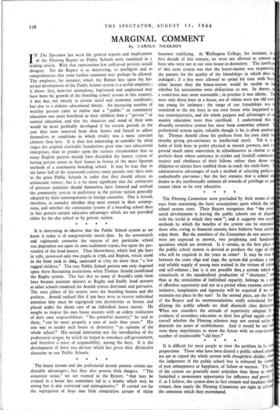MARGINAL COMMENT
NICOLSON By EAROLI)
IN The Spectator last week the general aspects and implications of the Fleming Report on Public Schools were examined in a leading article. With that examination few unbiassed persons would disagree. Yet the Report is so interesting, so intelligent and so comprehensive that some further comment may perhaps be allowed. The emphasis, for instance, which the Report lays upon the his- torical development of the Public School system is a useful emphasis ; it shows that, however anomalous, haphazard and unplanned may have been the growth of the boarding school system in this country, it was due, not merely to certain social and economic conditions, but also to a definite educational theory. An increasing number of wealthy parents came to realise that a " public " or community education was more beneficial to their children than a " private " or tutorial education, and that the character and mind of their sons would be more profitably developed if for certain periods in the year they were removed from their homes and forced to adjust themselves to conditions in which rivalry was a more constant element than love. It is thus less interesting to consider by what stages the original charitable foundations grew into vast educational enterprises, than to ponder upon the curious circumstance that so many English parents should have discarded the luxury system of having private tutors in their homes in favour of the more Spartan methods of a community boarding school. It may be true that in the latter half of the nineteenth century many parents sent their sons to the great Public Schools in order that they should obtain an aristocratic veneer ; but it is far more significant that the aristocrats of previous centuries should themselves have fostered and evolved the community system in preference to the private tuition generally adopted by their contemporaries in foreign countries. One is forced, therefore, to consider whether they were correct in their assump- tions, and whether the community system of a boarding school does in fact possess certain educative advantages which are not provided either by the day school or by private tuition.


























 Previous page
Previous page